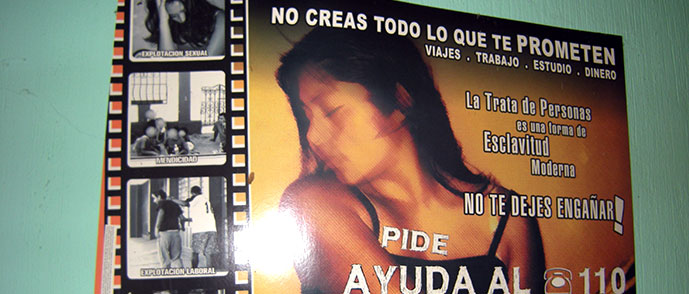Guadalajara, August 7, 2020 – The United Nations (UN) has established July 30 as the International Day Against Human Trafficking. It is a way of remembering the urgent need to eradicate this criminal practice that turns people into objects that are used and discarded. The Protocol to Prevent, Suppress and Punish Human Trafficking in article 3 in subsection « a » defines human trafficking as: « the recruitment, transportation, transfer, reception of persons, resorting to the threat or use of force or other forms of coercion, abduction, fraud, deception, abuse of power or a situation of vulnerability or the granting or receipt of payments or benefits to obtain the consent of a person who has authority over another, for exploitation purposes. This exploitation shall include, at a minimum, the exploitation of the prostitution of others or other forms of sexual exploitation, forced labor or services, slavery or practices similar to slavery, servitude or the removal of organs.”
There are different factors that make people susceptible to being victims of human trafficking: the presence of organized crime in their places of origin, irregular migrations, conditions of poverty, indigenous populations that leave their place of origin to seek work in the city. However, anyone can be a victim of this crime. At present, criminal groups to attract young people, deceiving them, and obtaining their personal data to later capture and sell them to the mafias and make them victims of trafficking, are using social networks. According to the UN, about 30 percent of victims of trafficking are children, and 70 percent are women and girls.
Recently a Mexican newspaper published an interview that illustrates how this crime happens. A fourteen-year-old girl went out with one of her cousins to a party in a town near hers. When they were waiting for public transport to return home, a truck driver saw them, approached them, and abducted them. They were taken to the border. They heard that the man wanted to sell something, later they realized that they were the merchandise.
Faced with restrictions to cross borders irregularly (without travel documents), some migrants run the risk of hiring the services of smugglers, using more dangerous routes, and facing risky situations to cross borders. Human smugglers take advantage of the fact that irregular migrants want to go unnoticed in order to deceive them, capture and exploit them; increasingly abusing the needs and despair of those seeking a better life.
These adverse situations make migrants and refugee claimants more vulnerable to abuse, exploitation, and the crime of trafficking. The travel and circulation restrictions in Central America and Mexico, imposed by the Covid-19 pandemic, have not stopped the mobility of those fleeing conflict, violence, or human rights abuses. In addition, it is expected in the short term that the economic crisis and lack of employment will lead to an increase in migrant smuggling and trafficking in persons from the most affected countries to more prosperous destinations, such as the United States or Europe.
The abuse and exploitation of people are evil actions that accompany humanity. It has been becoming more sophisticated and changing its name over time; however, human trafficking can be considered the modern form of slavery. Pope Francis, who from his episcopal ministry in Buenos Aires has committed himself to build a society without slaves or the oppressed, he considers human trafficking as “a plague that violates the dignity of the weakest brothers and sisters.” We must put a stop to this practice, eradicating this crime requires mentality, education, empathy and sensitivity towards our neighbor, to build support networks, to demand that we consider the lives of all people as sacred and inviolable.
Jairo Meraz Flores and Fr. José Juan Cervantes, c.s.
https://www.ohchr.org/…/professionalinterest/protocoltraffi…
Cfr. https://www.cndh.org.mx/noticia/dia-mundial-contra-la-trata…
https://www.milenio.com/…/dia-mundial-contra-la-trata-2019-…
https://www.razon.com.mx/mexico/oimos-venderian-400083
https://news.un.org/es/story/2020/05/1474412
Cfr. Ibid.
https://www.vaticannews.va/…/papa-francisco-mensaje-trata-p…


